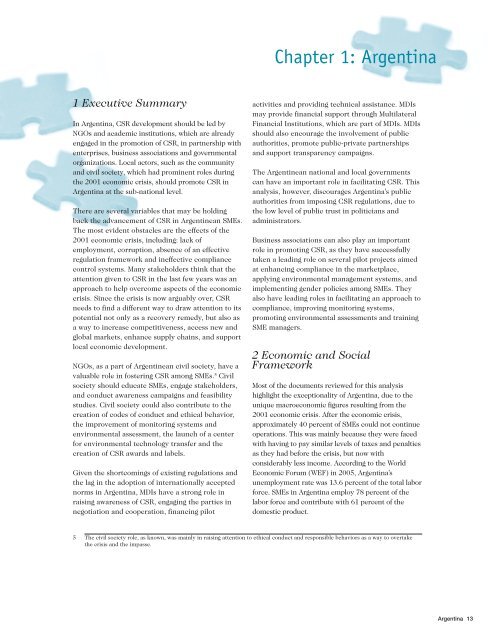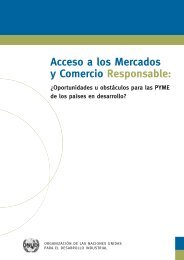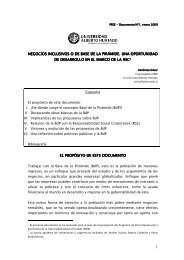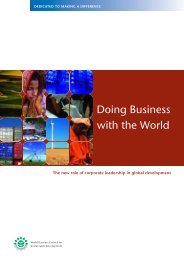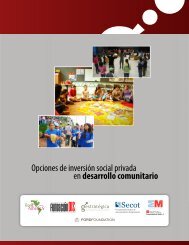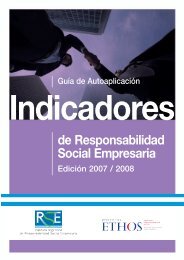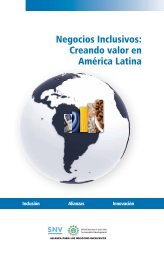Recommended actions to foster the adoption of Corporate Social ...
Recommended actions to foster the adoption of Corporate Social ...
Recommended actions to foster the adoption of Corporate Social ...
You also want an ePaper? Increase the reach of your titles
YUMPU automatically turns print PDFs into web optimized ePapers that Google loves.
Chapter 1: Argentina1 Executive SummaryIn Argentina, CSR development should be led byNGOs and academic institutions, which are alreadyengaged in <strong>the</strong> promotion <strong>of</strong> CSR, in partnership wi<strong>the</strong>nterprises, business associations and governmentalorganizations. Local ac<strong>to</strong>rs, such as <strong>the</strong> communityand civil society, which had prominent roles during<strong>the</strong> 2001 economic crisis, should promote CSR inArgentina at <strong>the</strong> sub-national level.There are several variables that may be holdingback <strong>the</strong> advancement <strong>of</strong> CSR in Argentinean SMEs.The most evident obstacles are <strong>the</strong> effects <strong>of</strong> <strong>the</strong>2001 economic crisis, including: lack <strong>of</strong>employment, corruption, absence <strong>of</strong> an effectiveregulation framework and ineffective compliancecontrol systems. Many stakeholders think that <strong>the</strong>attention given <strong>to</strong> CSR in <strong>the</strong> last few years was anapproach <strong>to</strong> help overcome aspects <strong>of</strong> <strong>the</strong> economiccrisis. Since <strong>the</strong> crisis is now arguably over, CSRneeds <strong>to</strong> find a different way <strong>to</strong> draw attention <strong>to</strong> itspotential not only as a recovery remedy, but also asa way <strong>to</strong> increase competitiveness, access new andglobal markets, enhance supply chains, and supportlocal economic development.NGOs, as a part <strong>of</strong> Argentinean civil society, have avaluable role in <strong>foster</strong>ing CSR among SMEs. 5 Civilsociety should educate SMEs, engage stakeholders,and conduct awareness campaigns and feasibilitystudies. Civil society could also contribute <strong>to</strong> <strong>the</strong>creation <strong>of</strong> codes <strong>of</strong> conduct and ethical behavior,<strong>the</strong> improvement <strong>of</strong> moni<strong>to</strong>ring systems andenvironmental assessment, <strong>the</strong> launch <strong>of</strong> a centerfor environmental technology transfer and <strong>the</strong>creation <strong>of</strong> CSR awards and labels.Given <strong>the</strong> shortcomings <strong>of</strong> existing regulations and<strong>the</strong> lag in <strong>the</strong> <strong>adoption</strong> <strong>of</strong> internationally acceptednorms in Argentina, MDIs have a strong role inraising awareness <strong>of</strong> CSR, engaging <strong>the</strong> parties innegotiation and cooperation, financing pilotactivities and providing technical assistance. MDIsmay provide financial support through MultilateralFinancial Institutions, which are part <strong>of</strong> MDIs. MDIsshould also encourage <strong>the</strong> involvement <strong>of</strong> publicauthorities, promote public-private partnershipsand support transparency campaigns.The Argentinean national and local governmentscan have an important role in facilitating CSR. Thisanalysis, however, discourages Argentina’s publicauthorities from imposing CSR regulations, due <strong>to</strong><strong>the</strong> low level <strong>of</strong> public trust in politicians andadministra<strong>to</strong>rs.Business associations can also play an importantrole in promoting CSR, as <strong>the</strong>y have successfullytaken a leading role on several pilot projects aimedat enhancing compliance in <strong>the</strong> marketplace,applying environmental management systems, andimplementing gender policies among SMEs. Theyalso have leading roles in facilitating an approach <strong>to</strong>compliance, improving moni<strong>to</strong>ring systems,promoting environmental assessments and trainingSME managers.2 Economic and <strong>Social</strong>FrameworkMost <strong>of</strong> <strong>the</strong> documents reviewed for this analysishighlight <strong>the</strong> exceptionality <strong>of</strong> Argentina, due <strong>to</strong> <strong>the</strong>unique macroeconomic figures resulting from <strong>the</strong>2001 economic crisis. After <strong>the</strong> economic crisis,approximately 40 percent <strong>of</strong> SMEs could not continueoperations. This was mainly because <strong>the</strong>y were facedwith having <strong>to</strong> pay similar levels <strong>of</strong> taxes and penaltiesas <strong>the</strong>y had before <strong>the</strong> crisis, but now withconsiderably less income. According <strong>to</strong> <strong>the</strong> WorldEconomic Forum (WEF) in 2005, Argentina’sunemployment rate was 13.6 percent <strong>of</strong> <strong>the</strong> <strong>to</strong>tal laborforce. SMEs in Argentina employ 78 percent <strong>of</strong> <strong>the</strong>labor force and contribute with 61 percent <strong>of</strong> <strong>the</strong>domestic product.5 The civil society role, as known, was mainly in raising attention <strong>to</strong> ethical conduct and responsible behaviors as a way <strong>to</strong> overtake<strong>the</strong> crisis and <strong>the</strong> impasse.Argentina13


